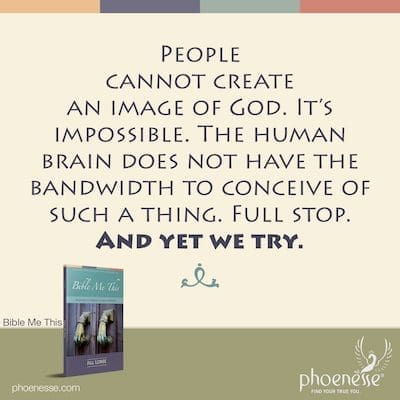The Pathwork Guide offers helpful insights, with four of ten commandments further explained. Here are all Ten Commandments, in brief:
1 Thou shalt have no other gods before me.
2 Thou shalt not make unto thee any graven image.
3 Thou shalt not take the name of the Lord thy God in vain.
4 Remember the Sabbath day, to keep it holy.
5 Honor thy father and thy mother.
6 Thou shalt not kill.
7 Thou shalt not commit adultery.
8 Thou shalt not steal.
9 Thou shalt not bear false witness against thy neighbour.
10 Thou shalt not covet.

2. Thou shalt not make unto thee any graven image.
In his teachings, the Guide uses the word “image.” He chose this word as a symbol, if you will, of something that is like a picture. Both a picture and an image connote a thing that is rather dead—an imitation of life. Although a picture may seem like art, it is nevertheless not real, as something in nature would be.
The images that live inside of people are not so different. They are pseudo-defenses, conclusions drawn at a young age about how the world works, that we unconsciously hang onto as a way to understand the world and stay safe. Our intention is for them to bring happiness—beauty. But it never actually works that way. Just the opposite in fact, because they are based on unreal assumptions.
In the second commandment, it says, “Thou shalt not make unto thee any graven image.” In fact, people cannot create an image of God. It’s impossible. The human brain does not have the bandwidth to conceive of such a thing. Full stop. And yet, we try. Despite this commandment, people have made an image of God and it has turned out to be tragically damaging. We have anthropomorphized God into a person who arbitrarily metes out punishment—you, you’re in; you, head South. That is what happens when we attempt to make an image of God.
With time and maturity, we can come to realize just how limited we are in understanding the greatness of God, the creator. That’s the awe and respect that comes with wisdom. But this isn’t an unhealthy attitude in which we make ourselves a small sinner, diminishing our own worth. To do that would be to diminish the value of God.
It is only the immature, spiritual infant who will beat themselves up for not grasping that which we’re not able to grasp. God is the great universal mind, and our knowing that is wisdom. As we grow, we may have bursts of awareness—just a few moments in a lifetime—of just how incapable we are of comprehending God. In that moment, we are much greater than we were before. Just a bit more like God.
4. Remember the Sabbath day, to keep it holy.
As always, this statement has meaning on many levels. On the outer level, it had a very different meaning when it was originally said than it could possibly have today. At that time, people were fairly crude in terms of their development. If they hadn’t been pointed in the direction of God, toward whom our thoughts and feelings should be devoted at least to some degree, their lower natures would have gotten more out of control than they already were. Yes, placing a “must” on us by way of an outer law is not really what spirituality is all about. But when primitive instincts were still running rampant, an outer law was really needed.
Going to a deeper level, this commandment is about finding balance in our activities. We should devote part of our lives to our duties, livelihood and responsibilities, whatever they are. We should devote another part devote to our spiritual unfoldment. And still another part should go to pleasure and enjoyment of life. We need to relax. And we want to be harmonious in how we distribute all our activities so that we don’t become one-sided. We want to be healthy in our bodies and our souls, and balance is an important aspect of our health.
This law can’t have the same meaning today because “I must keep the Sabbath” would create a compulsion. Performing such an unfree act wouldn’t accomplish anything. For example, it is possible to be a workaholic and still keep the Sabbath, which falls far short of the whole point of this commandment. We need to use our judgment and common sense to find the right balance for us without sticking to rules but rather using our free choice wisely. With rigidity, we lose the inner meaning.
It’s fine if people want to take the Sabbath—Saturday or Sunday—as their one day a week to rest and relax. But what does it mean to rest? What is the only source that we can ever go to for strength? That of course is God. And God doesn’t only work on weekends.
God gives us strength if we work to know ourselves so that we can overcome our weaknesses, our misconceptions, our limitations and our blindness. The God in each of us can only manifest by way of our self-searching, when we are honest with ourselves and working to grow and heal. We can’t do this in a single day every week. But we can devote a certain amount of time to our inner life—to contemplation, reflection and self-observation. That’s the only way we can tune into the divine forces that would otherwise be out of our reach.
The word “Sabbath” means rest, and it also means the number seven. Hence, the seventh day, according to Scripture, is the day of rest. There is also a mystical meaning for the number seven. It is a holy number that indicates something is coming to a close—to a whole. It’s not an end, for there is no such a thing; there is always a new beginning. So it is like the closing of a circle or a cycle. When the circle is complete, there is a state of peace—of rest.
On a spiritual path, we are following the movement of a spiral. It may seem sometimes like we are going in circles, but over time we’ll see this isn’t so. In actuality, unless we’re stuck, a similar-looking cycle is happening on a deeper, or higher, level.
Seven indicates the phase that is most restful and from which we can gain an overall view. We can then see how certain puzzle pieces fit and are falling into place. Having that clarity gives us a certain peace. This is restful. And then along comes the next ascending cycle when we again become upset or restless, when things seem out of place, again, and then we wonder if that past peace was just an illusion. This confusion though will lead us to deeper insight and peace at the next resting point when the cycle closes again, assuming we are doing the work with some depth and goodwill.
Here on planet Earth, weeks pass in these seven-day cycles. They are a symbol of the smaller cycles inside the larger ones. The timing and length of individual cycles is actually variable with each person. One might be long, another short—there isn’t any regularity in them. On this plane, the measurement of time is entirely symbolic. But in reality, there can’t be any rigidity. We can’t force the stages artificially. They will emerge from the personal work we do, from our own needs and problems and personalities. They emerge based on our own efforts.
Periodically, we can assess the arc of our progress. Yom Kippur is designated as the Sabbath of Sabbaths in the Jewish religion. On this special day an inventory should be made. This of course doesn’t mean that this must only be done on this one day. From this overall viewpoint, we can see where we stand, how far we’ve come, and what remains to be accomplished, as best we can foresee.
Having rituals for this can be an invitation to think about the inner meaning. But we need to always look beyond the ritual for the deeper meaning. Rituals are only signposts or reminders, and on their own do not serve any purpose. There are two categories of wrong responses we often have to rituals.
Some people will adhere to them to gain an imaginary sense of safety—to check a box. When we do this, we hope that going through the motions will activate the meaning behind it. This is the lazy way and it is wishful thinking. We want the goodies but aren’t willing to pay the price. Many people belong to this category, and not just those in religious denominations.
In the other category are people who say that ritual means nada. And to some extent, they’re right. But they’re also sort of wrong. Because something wise, true and flexible may be living in the practice of a ritual. When such people close themselves to the possibility of such an experience, they aren’t thinking any more freely or independently than the people who follow rituals like sheep.
Circumcision is an example of a ritual that was introduced during a time when humanity was in a very primitive state. All over the Earth, blood sacrifice was used to assuage people’s guilt for betraying God, ignoring truth and giving in to the temptations of the Lower Self. Times were tough. Then, when the ancient Jews, who worshipped God as being the one and only true God, were instructed by the Lord to stop sacrificing human lives, they had to come up with some modified version of blood sacrifice just to cope with their overwhelming inner guilt.
In no way did this law have anything to do with health or hygiene. That was a superficial rationale that covered the fact that the true meaning could not have been understood. Because it really made no sense. As humanity has matured, continuing this barbaric ritual makes even less sense.
Today, people are sufficiently adult to man up and face our guilts directly. We need to apologize for the pain we cause others, which is the origin of justified guilt. Unjustified and displaced guilts need to just be obliterated. They serve no good. Suffering, which is the effect of guilt that is no longer connected with the cause of it—justified guilt—also isn’t necessary, appropriate or desirable. We need to learn to address things realistically.
Speaking of which, circumcision really does induce suffering for the male baby. What about the female human being? In fact, there is a meaning behind the great suffering that women have endured in the process of childbirth, up until fairly recently. This has also been a displaced “blood sacrifice,” the female version of atoning for guilt in the soul.
Once humanity became ready to deal with guilts in a more direct and effective way, medicines and natural techniques have come onto the scene that have made it possible to not endure suffering during childbirth. There is an undesirable effect on our entire being when we perpetuate customs that are no longer appropriate. It truly blocks the harmonious flow of evolution.
5. Honor thy father and thy mother.
This one has been so misunderstood, with much harm ensuing from superficial interpretations. Because it could be that what one observes is not deserving of one’s love and respect. Yet forcing and guilt are two qualities that don’t jibe well with love and honor. When our early impressions are squashed and superimposed with a directive to artificially or compulsively love or honor, we end up driven further from the possibilities of actually loving and having true respect.
It also leads to people over-honoring a parent—in their actions and deeds—in a way that is self-effacing and self-destroying. This is a cover-up of the guilt for the resentment, hate and hostility that smolder under the surface. Only when we face these hostilities and make peace with them do we reach a real understanding and forgiveness of our parents’ shortcomings. This is not an enforced or superimposed remedy. Then we can find the right middle way between doing what’s best for them and possibly putting our own advantage a bit to the side, but also honoring ourselves as well.
To honor another does not mean we give up our own life. Nowhere in the Bible, or in any other holy Scripture, does it say that we shouldn’t honor ourselves. But many of us live our lives in a way that constantly shows dishonor toward ourselves. We put everyone and everything ahead of ourselves, and often honor our parents for the sake of disregarding our own growth and right to live.
When this happens, we can be sure that the very opposite feelings are smoldering underneath and we aren’t daring to look at them. But we can’t give what we don’t have. We can’t honor a parent—or anyone else for that matter—if we are disregarding our own life. It doesn’t work to just operate from blindness and just hope for the best. We need to see the truth. When we do, we can come to respect the basic humanity in everyone, regardless of their own aberrations or blindnesses.
From a spiritual perspective, one person gaining inner truth—as happens when one does the work of self-knowing—will have infinitely greater influence on the development of the entire cosmos than do millions of people in error. Believe it or not friends, this fantastic statement is utter truth.
6. Thou shalt not kill.
We can apply all of the commandments on all levels of our personalities. So this commandment is not just about the act of physically killing someone. The terms “life” and “death” apply to more than just the body. Thoughts and emotions, too, can snuff another out.
There is also a way that we deaden ourselves by darkening our own life force. All of our destructive aspects, including our images and unresolved problems, have a negative impact on us and everyone around us, essentially killing life. The more we advance, the more we’ll see this.
Here’s an example of how “emotional killing” looks. When we feel rejected and insecure, we tend to try to please the very ones whose acceptance we crave but don’t have. We often do this by despising anyone we think is also despised by the one whose attention we want so badly. This might be subtle, but it’s not uncommon. Such a betrayal hurts and rejects others while bringing us the opposite of what we originally wanted. This may not manifest through our word or deeds, but rather lays hidden in a well-camouflaged attitude. We might even bend over backwards to hide it. Nevertheless, it’s in there, causing damage.
Our entire being can’t be filled with love and truth unless we uncover all these areas where we aren’t really being loving and aren’t so much in truth either. That’s the doorway that leads to real salvation, and the only way to get there is through this work of fully understanding ourselves. There are no shortcuts, no magic formulas, no mantras, no miracles, and no easy ways to do this.
Only utter self-honesty in everything we do—major, minor and seemingly insignificant—will get us there. But if we persevere in this goal, our whole beings will become more and more healthy and of benefit to ourselves, to others and to this entire amazing universe.
Return to Bible Me This Contents



